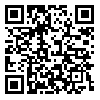BibTeX | RIS | EndNote | Medlars | ProCite | Reference Manager | RefWorks
Send citation to:
URL: http://bcn.iums.ac.ir/article-1-1804-en.html
2- Department of Psychology, Faculty of Psychology and Education, University of Tehran, Tehran, Iran.
Introduction: During the Coronavirus Disease 2019 (COVID-19) outbreak, news media has played an important role in informing people to satisfy their curiosity about this stressful condition. Regular exposure to such stressful news may elicit different emotions in people and engage them in using strategies to control their emotions. In the present study, we aimed at exploring the most common negative emotion(s) experienced by individuals, as well as the most frequent Emotion Regulation (ER) strategies used facing the COVID-19-related news. We also examined whether the variable of personal relevance can moderate these emotional responses.
Methods: 617 individuals living in Tehran who regularly read the news about the COVID-19 from the early stages of spread completed an online survey. After excluding the participants with high scores from the Beck Depression Inventory (>18), data obtained from 443 participants were analyzed in terms of the experienced negative emotions and ER strategies.
Results: Anxiety (55.8%) was the most common negative emotion reported by participants facing COVID-19-related news and problem-solving was the most frequent strategy used to control negative emotions. Both groups with high and low personal relevance indicated a similar pattern in experiencing high and low arousal emotions, as well as using ER strategies, and no significant differences were found (X2=0.006, p=0.51; X2=0.14, p=0.39, respectively). We also found that participants with high scores in the resilience scale used an integrative rather than a single approach of the ER strategies (rbp=0.15, p=0.01).
Conclusion: We found that during the COVID-19 outbreak, news media may have important role in triggering anxiety in people who regularly read the relevant news, and problem-solving was the most frequent strategy among them. Being directly involved with COVID-19 in personal life did not make any differences in the way that individuals emotionally respond to the news. While using an integrative approach in regulating emotion was found in more resilient individuals..
Received: 2020/06/1 | Accepted: 2020/06/9 | Published: 2020/06/12
| Rights and permissions | |
 |
This work is licensed under a Creative Commons Attribution-NonCommercial 4.0 International License. |








